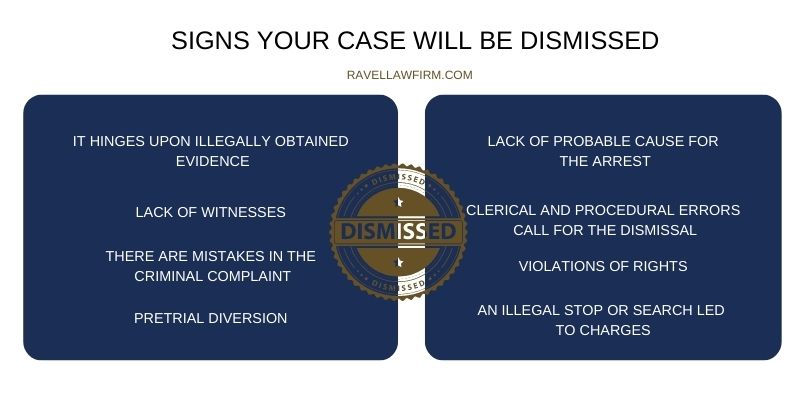You are going through the most challenging periods of your life if you have been accused of a crime. You could be concerned that you’ll have to pay a hefty fine and spend time in jail, but don’t worry, we have some points for you.
Though plea bargains handle many criminal proceedings, some are determined at trial or via motions brought forth by the defense. You might get the charges accusing you dismissed in some circumstances by presenting reasons.
Criminal charges may be dropped at trial or even earlier if the evidence is insufficient. Let’s look at the indications that a criminal case may be dismissed if you’re concerned that this might occur in the future.

What Is a Dismissed Case?
A case is declared closed when it is dismissed, meaning that there was no guilty verdict or conviction of the accused in a criminal case. A dismissed case somehow doesn’t establish the defendant’s actual innocence for the offense for which he has been arrested, even if the offender was not found guilty. A case that has been dropped will still show up on the defendant’s criminal history.
On What Grounds can a Case be Dismissed?
Towards the court and the public, prosecutors have a moral obligation of openness. A case win is something that prosecutors also want. A prosecutor must acquire additional evidence to maintain the case or dismiss it if they suspect the criminal case has flaws.
The court may decide to drop the charges against you if it determines, among other things:
- Your actions did not constitute a violation of any criminal statute.
- They lack the evidence to establish your guilt.
- The police violated your rights as they were looking into the case.
The prosecution could drop the case without penalty if it feels it can find new evidence. To be clear, if the charges are dropped “without prejudice,” the prosecution is free to re-file them at any time.
Read Also: Can Charges Be Dropped At An Arraignment Hearing?
Signs Your Case Will Be Dismissed
The following are indicators of prosecutorial incompetence that may lead to the dismissal of a criminal case before the trial begins.
1. Illegally Obtained Evidence
Criminal cases that rely on evidence obtained dishonestly tend to be weak. All evidence presented in court must have been obtained lawfully and with all necessary authorization.
The conduct of illegal searches is also just caused for termination. To give a basic example, cops cannot arbitrarily stop a car, order the driver out, and then search the vehicle. If narcotics were detected, the arrest would still be overturned.
The police need a warrant to search a suspect’s home or automobile, even if it’s just to look in the glove box or open a drawer. The police still need a search warrant to search, even if they have probable grounds to do so.
2. Lack of Witnesses
The absence of witnesses is a red flag for the prosecution, as they are crucial to winning criminal prosecutions.
In the lack of eyewitness testimony or scientific proof (video, DNA, fingerprints, etc.) linking you to the crime scene, the prosecution will have a hard time proving its case. Also, you always have an option To Convince Prosecutor To Drop Charges.
3. Mistakes in the Criminal Complaint
A charge sheet is the official record of an arrest made by law enforcement. The signing officer swears under oath that everything written here is entirely accurate. If an error, even a sincere one, is made at this stage, the entire case could be lost.
4. Pretrial Diversion
Subtle signs pointing to a weak criminal case might become apparent. Nonetheless, you should recognize that the pursuit of justice remains possible, even in the face of a less convincing prosecution.
Defendants in alcohol and drug charges may be offered pretrial diversion in exchange for completing certain conditions set by the prosecution. These conditions may include attending an addiction treatment program, performing volunteer work, or paying a fine. Following this, the charges will be dropped and the file will be closed.
5. Lack of Probable Cause for the Arrest
Without evidence of criminal wrongdoing, prosecutors cannot pursue formal charges or indictments. Having probable cause to make an arrest is essential for maintaining the rule of law. A criminal complaint or charge must be dropped if insufficient evidence supports its filing.
The existence of probable causation depends on the unique set of factors at play in each case. The term “probable cause” refers to the reasonable expectation of a law enforcement officer, based on the objective assessment of information and circumstances accessible to that officer that the person being arrested has done or is amid committing a crime.

Despite being a low threshold, probable cause is essential to our justice system. This implies that a suspect can’t be detained based on mere suspicion. The goal of the possible cause criterion is to prevent the unlawful detention of innocent persons.
If You Are Looking For Divorce Lawyer In Queens, Contact our expert Attorney Today!
6. Clerical and Procedural Errors
Issues in the complaint or other clerical problems may also lead to dismissal. Some details must be correct to link a specific criminal with an allegation, including the defendant’s name, gender, height, area of residence, location of the alleged offense, and other crucial information. The complaint must accurately state the defendant’s name and county of origin.
It is necessary to dismiss the charge, but the prosecution may be dissuaded from re-filing it if the defense attorney has time to reach a plea deal or obtain exculpatory evidence.
The prosecutor is much less likely to drop significant charges but more likely to drop minor ones that aren’t worth pursuing. Either way, a skilled criminal defense lawyer can assist you in having the charges dropped or reduced. Your charges may be dismissed if you finish a probationary course with their assistance.
7. Violations of Rights
Confessions obtained under duress, evidence gleaned from unlawful searches, and illegal arrest is all inadmissible to the prosecution. The charges could be dropped if the plaintiff’s rights were infringed, but new evidence could lead to filing new accounts in court.
8. An Illegal Stop or Search Led to Charges
A police officer cannot pull over a car at random unless the driver has broken the law or the police officer has probable cause to believe a crime has been committed. Police can only search a vehicle after a stop if they have a permit or reasonable suspicion, and the same is true of a person’s residence or other private property.
Without a license or difficult circumstances, all evidence gleaned from a search of your car or property is inadmissible in court. If the evidence is thrown out, the case against you can also be dropped.
Why Do Courts and Prosecutors Dismiss Charges?
Even if charges are filed, they may be dropped for the same factors that warrant not filing them in the first place. The quality of the evidence may be low, witnesses are unavailable, or that unlawful means were used to obtain evidence or arrest people.
Once again, a defense attorney can be helpful here, as this is best accomplished at the pretrial negotiation portion of the case.
A defense attorney may try to get charges dropped or dismissed before trial by arguing that the prosecution has little chance of winning. The prosecution could make a counteroffer of a reduced cost. If that happens, your lawyer may say that no number of reduced charges will hold up in court.
We Also Talked About: Can Charges Be Dropped After Indictment?
What is a Grand Jury Dismissal?
Whenever a grand jury is assembled to consider an indict on a charge but decides against doing so because there isn’t enough evidence, the matter is said to be dismissed. The prosecution or the grand jury may then choose to drop the charges. Instead, of wasting time and resources prosecuting a case they know they can’t win, prosecutors would rather do that.
Again, removal of a grand jury is only possible before an indictment.
What Happens After Charges Are Dismissed?
You can go back to your life as usual if criminal charges concerning you have been dropped, either because of a not-guilty verdict, a lack of evidence, or a plea bargain with the prosecution. A person cannot be arrested twice for the same offense unless fresh evidence is presented after the initial charges were dropped before trial.
Even if your case is dismissed, the accusations will remain on your record and may surface if you apply for a job, rent a place, or try to get certified or licensed in a professional field. Your record won’t be spotless until it’s been erased.
To begin this process, a petition must be filed with the local courthouse in the county where the original charge was laid. If you hire a lawyer to handle the paperwork and filing for you, you won’t have to worry about any hiccups that could lead to a rejection of your expungement request.
Video Guide On Case Dismissal Signs

FAQ’s
What causes a case to be dismissed?
Lack of authority, inadequate service of processes, failure to register a party, and failure to claim remedy are all procedural and substantive grounds for dismissal.
Why do Lawyers drag out cases?
They plan to extend the lawsuit as much as possible while paying out as little as feasible. A lawyer who is paid by the hour stands to gain financially from this strategy, while the plaintiff’s frustration and desperation may lead to a more favorable settlement.
What is one reason Prosecutors may decide to dismiss cases?
If the prosecutor determines insufficient evidence to sustain criminal charges, those charges may be dropped. It’s also possible that the discovery of fresh evidence weakens the state’s case against the defendant.
Final Words On Case Dismissal Chances
Many warning indications indicate a criminal case is not strong enough to warrant going to trial, and an intelligent prosecution will not even bother with such a case unless they are very confident of their ability to do so. Main symptoms of a poor argument include those already mentioned, such as an insufficient amount of evidence, an illegal arrest, or a lack of witnesses.

Hi, I’m Brian Gary; I have my Doctor of Juridical Science (SJD) degree from SMU Dedman School of Law in Dallas. Over the years, I have dealt with many families and successful corporate Legal cases. I have counseled many people on legal matters, and along with my profession, I write about Law on my blog. Please feel free to contact me for counseling/case discussion; I’ll be happy to help you.